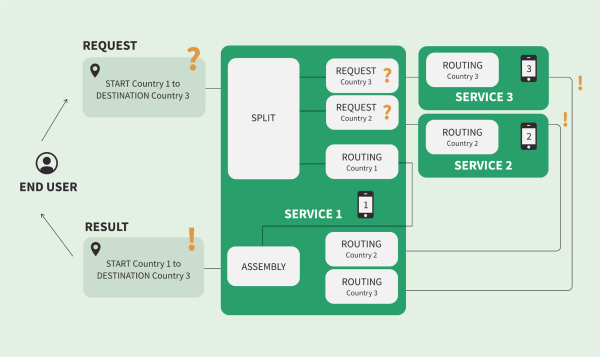Oct 20, 2023
At the second OJP4Europe event on 18th October 2023 in Vienna, 50 leading experts discussed the latest developments and perspectives in cross-border travel planning using the OJP standard in Europe.
"How many different travel information services did you have to use to get to this event?" Nicole Bartl, expert at AustriaTech, asks the participants at the beginning of the conference. Most of the international conference participants state two to three, answering not only how but also why they have come together in Vienna on this Wednesday. Namely, to tackle the central problem of fragmented travel information. The common vision: with integrated solutions and uniform standards, such as the OJP standard, travel routing in Europe should seamlessly interlock - regardless of country and fare boundaries.
In the discussions and presentations at the event, developments and opportunities around the OJP standard were examined from different perspectives: From aspects of technical functioning to the common language in communication between different operators (B2B). Concrete projects and initiatives were presented, including OJP4Danube, LinkingAlps and EU-Spirit.
But the conference did not only focus on the present, but also on the future. Here, the focus was on the upcoming MMTIS revision, which will enable EU-wide multimodal travel information services, and MDMS, the EU framework for the provision of Multimodal Digital Mobility Services. Another highlight was the presentation of OJP version 2.0, which is planned for 2024. OJP 2.0 will be more responsive to the changing needs of public transport, and better harmonized with other standards such as NeTEx and SIRI. "Our work has focused on adding services, such as availability, refinement, recalculation or line information, that widen the scope and flexibility of the interface and enable journey planners to incorporate use cases from the single platform also in the distributed journey planning scenario," says Norman Offel, Hacon. Despite all these developments, the current XML format will be maintained.
National Access Points (NAPs) play a significant role in national data exchange in public transport. Despite some challenges, including quality issues, NAPs are continuously working on improvements. The OJP community emphasizes that organizational hurdles are as significant, and often more difficult to overcome, than technical ones. The challenge is to find a common path that takes into account the existing different structures and frameworks and can overcome resulting technical, organizational and administrative hurdles.
The OJP standard holds promising potential to address cross-border travel planning challenges. Especially at the interfaces between countries, national and international data is crucial, even if it is costly to obtain. But the question that arises is: Is the public willing to pay for it? It is imperative to create awareness that services are not free, especially when higher quality solutions can be offered. "The advantages of open standards are clear: We have a common EU language that we can use with other EU countries to interconnect our systems, and on a long term perspective we see the possibility to exchange rich and high-quality data," expresses Roberto Cavaliere, NOI Techpark South Tyrol / Alto Adige.
Equally important is the governance that underpins the business model. Careful maintenance of data is essential to ensure that financial resources are not spent for unnecessary purposes. Given the different types of NeTEx and the completely different IDs in these systems, it is clear that solutions to problems require high initial efforts, but can lead to significant cost savings in the long run.
During the event it became clear that although the technical aspects can be challenging, solutions can still be found. In contrast, organizational challenges often proved more difficult - yet the good cooperation in this area was highlighted. It was also stressed that cooperation with local authorities is easier compared to European cooperation, as it is often unclear at European level who is responsible for international datasets. The European Commission sees NAPCORE at European level as the key to resolving responsibilities for long distance travel, with the country of departure bearing the responsibility.
The most urgent steps for pan-European cooperation are to create a comprehensive approach to integrating the different initiatives. In doing so, it is important to work together on a business model. NAPCORE alone cannot solve everything, so existing standards should be better used and developed.
It is important to take into account the needs of different user groups, both local and long-distance, and to adopt a multimodal approach. The availability of long-distance data is one of the next big goals, as this is an important basis for cross-border travel planning and can thus best support the mobility shift.
The OJP community can be proud of its unique selling point and take concrete steps to advance the vision of seamless cross-border travel planning. It is a step-by-step process that requires a lot of work, but those present are motivated to follow this path. Whether, as suggested, under one roof analogous to the C-Roads platform remains to be seen. But everyone was in agreement:
Let's cooperate and network so that the vision of seamless ticket services becomes reality in 2030 (as a participant stated)!
The big challenge of distributed trip planning is to split a large task - a trip request that exceeds the limits of a single trip planner - into a group of smaller tasks, each of which can be processed by multiple local trip planners and then reassembled and presented as a single route result. A simplified process might look like this:

The main technical principle of distributed journey planning is to split a large task - a travel request that crosses the boundaries of one journey planner - into a series of smaller tasks, each of which is processed by multiple local journey planners and then reassembled and presented as a single routing result.
The OJP standard makes it possible to link travel information by using a uniform data format from different providers across national borders. At the same time, providers retain sovereignty over their data, as it is not collected at a central location but shared with other providers simultaneously.
You can find more information in the LinkingAlps brochure.
Here you can watch the LinkingAlps video series for more details:
The event was held as an Eco Event.
